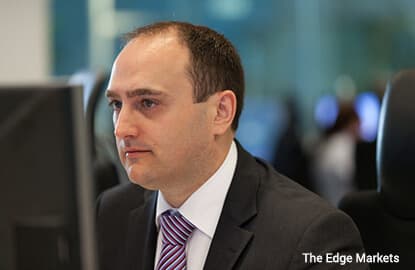
This article first appeared in Personal Wealth, The Edge Malaysia Weekly, on May 30 - June 5, 2016.
In a tumultuous year for financial markets, fixed-income instruments can be relied on as a source of stability as they continue to provide a steady income stream, according to bond giant Pacific Investment Management Company (Pimco).
Senior portfolio manager Dr Luke Spajic says that while the global economic environment is in a divergence — as a result of normalising interest rates by the US Federal Reserve and quantitative easing measures undertaken by the European Central Bank and the Bank of Japan — there are opportunities in bonds.
“Growth has been disappointingly low around the world for the last few years. However, some countries are doing better than others … and we see value across global credit markets and use our bottom-up skills to build robust income generative strategies,” says Spajic. The Pimco group had about US$1.5 trillion under management as at March 31.
“From this global policy divergence, we can move to differentiate … and focus our attention on particular fixed-income markets that should perform well even if growth is low or when the risk diverges,” he adds.
Spajic says that in navigating through the economic uncertainty, the company has identified three factors that are likely to dominate in the coming months. “These are China, commodities and central banks. We are watching these three themes very closely. From that we get a number of key signposts that are going to help us navigate these markets.”
Pimco notes in its outlook in March that the devaluation of the renminbi by far poses the single biggest risk for the global economy and financial markets. “Our base case is for a more benign muddling through, where the renminbi depreciates gradually and mostly orderly,” it says, adding that this hinges on the capabilities to stem the huge capital outflows before the world’s second largest economy eats through its foreign exchange reserves.
The People’s Bank of China had previously noted that holdings of foreign exchange purchases held by Chinese financial institutions fell RMB54.4 billion to RMB23.78 trillion in April.
“China is more likely than not to manage the challenges of capital outflows without a major disruptive devaluation,” says Pimco. Commodities, on the other hand, could be on the path to recovery as the company believes the dramatic oil price decline could be coming to an end.
“Higher demand sparked by lower prices and, more importantly, ongoing supply rebalancing will likely take oil higher in the course of this year to around US$50. That said, we are cognisant of the risk of a renewed drop below US$30 in the near term,” the company adds. Brent was trading at US$48.18 per barrel last Tuesday.
As for central banks, Pimco is of the opinion that the institutions are nearing the limit in their ability to stimulate asset prices and introduce loose monetary policy. “Overall, we believe that monetary easing, if done in the right way, can still be supportive of asset prices, growth and inflation, even though the returns are clearly diminishing.”
As a result, global growth will remain low, says Spajic. But he does not see an imminent collapse on the horizon. “In the base case, we see no global recession although markets have been over-anticipating a recession this year,” he adds.
With lower yield and volatility in mind, Spajic says investors are looking to generate higher returns without taking on significantly more volatility, and this has led to a significant focus on income themes that have an outright capital gain.
“Investors will be looking beyond government bonds to add value or yield to their portfolios [can look to corporates], especially in deliver high-quality income space,” he says, adding that among Pimco’s areas of focus are US bonds and European investment-grade bonds.
Capitalising on this trend, Affin Hwang Asset Management Behd recently collaborated with Pimco to launch the Affin Hwang Global Income Fund — a wholesale fixed-income feeder fund that seeks to provide regular income to sophisticated investors by investing in a collective investment scheme, Pimco’s Global Investors Series (GIS) Income Fund.
According to Affin Hwang, Pimco’s GIS Income Fund has delivered an annualised monthly distribution yield of more than 4% annually, outperforming its benchmark, the Barclays US Aggregate Index. —
Save by subscribing to us for your print and/or digital copy.
P/S: The Edge is also available on Apple's AppStore and Androids' Google Play.